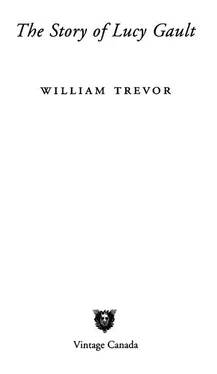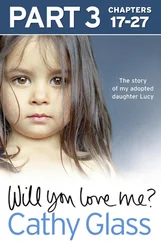Trevor, William - The Story of Lucy Gault
Здесь есть возможность читать онлайн «Trevor, William - The Story of Lucy Gault» весь текст электронной книги совершенно бесплатно (целиком полную версию без сокращений). В некоторых случаях можно слушать аудио, скачать через торрент в формате fb2 и присутствует краткое содержание. Год выпуска: 2002, ISBN: 2002, Издательство: Knopf Canada, Жанр: Старинная литература, на английском языке. Описание произведения, (предисловие) а так же отзывы посетителей доступны на портале библиотеки ЛибКат.
- Название:The Story of Lucy Gault
- Автор:
- Издательство:Knopf Canada
- Жанр:
- Год:2002
- ISBN:9780307366047
- Рейтинг книги:5 / 5. Голосов: 1
-
Избранное:Добавить в избранное
- Отзывы:
-
Ваша оценка:
- 100
- 1
- 2
- 3
- 4
- 5
The Story of Lucy Gault: краткое содержание, описание и аннотация
Предлагаем к чтению аннотацию, описание, краткое содержание или предисловие (зависит от того, что написал сам автор книги «The Story of Lucy Gault»). Если вы не нашли необходимую информацию о книге — напишите в комментариях, мы постараемся отыскать её.
The Story of Lucy Gault — читать онлайн бесплатно полную книгу (весь текст) целиком
Ниже представлен текст книги, разбитый по страницам. Система сохранения места последней прочитанной страницы, позволяет с удобством читать онлайн бесплатно книгу «The Story of Lucy Gault», без необходимости каждый раз заново искать на чём Вы остановились. Поставьте закладку, и сможете в любой момент перейти на страницу, на которой закончили чтение.
Интервал:
Закладка:
The splinters savaged him when he knelt. Droplets of blood were warm on his legs when he stood up again, and he said he was sorry for bringing more blood into the room.
‘No more than shadows,’ he said, and explained because it wouldn’t be known. No more than shadows in the smoke when he looked back and people were carrying the body.
*
‘This is my daughter, Mr Horahan. My daughter is the child who was here then.’
Upstairs a door softly banged, the way doors sometimes did when a breeze blew in from the sea, its handle rattling because that handle was loose. In the quietness of the room Lucy tried to say that she might have married the man she loved, that her father and her mother had been driven from their house, that her mother had never recovered from her distress. It was the truth; she had come to the drawing-room to say it because it was all that was left to say, but the words would not come. The flowers she had earlier arranged, white campanulas, were pale against the sun-browned wallpaper. Smoke curled lazily from her father’s cigarillo.
‘That’s a lovely evening for your journey back,’ her father said.
She thought she had misheard, so extraordinary did that politeness seem. Again there was the urge to speak of the destruction in their lives, of fear and chaos where there had been happiness once, of pain. But again her anger collapsed, unable to break out.
‘Well, now,’ her father said, and crossed the room to the door, opening it and standing there. ‘Go safely now,’ he said in the hall.
She went with him, as if he’d asked her to, but he hadn’t. Outside, the sun slanted over the gravel and the front-door steps. The sea in the distance was quiet. She might have wept but she had not and she did not now; she wondered if she ever would again. For a moment she looked into the features of the man who had returned after so long and saw there only madness. No meaning dignified his return; no order patterned, as perhaps it might have, past and present; no sense was made of anything.
‘Every day I light the candle,’ he said.
‘Of course,’ her father said. ‘Of course.’
Bicycle-clips were carefully put on and then the afternoon’s visitor rode off, a gangling figure on his big iron bicycle. They watched the bicycle disappear on the avenue, and when her father said he was sorry she knew from his tone that he realized why she had dressed herself up.
They walked a little way on the avenue, not saying anything before her anger broke, fiercely wrenched from her tiredness with an energy of its own. She cried out after the man who had gone, her anguish echoing in the trees of the avenue, her tears damp on her father’s clothes when he held her to him.
‘There now, there now,’ she heard his voice, the two words murmured, again and then again.
8
Henry and Bridget had not yet begun seriously to suffer from the elderly ailments that were later to incapacitate both of them. When their aches began – Henry’s knee, Bridget’s shoulder when it was damp – they trusted to Providence; when in his workshed one day Henry was aware of a tightening in his chest, he stood still and felt it go away. Bridget had become deaf in one ear, but maintained that the other would see her out.
A greater, and unexpected, calamity was the creamery’s declaration that the Lahardane milk was infected. It was discovered later that tuberculosis had spread in the herd: after the mandatory slaughter only eight cows would be left. Since the Captain’s return he had assisted Henry with the milking, in which he was not skilled. This and all it otherwise involved – driving the cattle in twice a day to the milking parlour, scalding the churns, hosing out the dairy – was already becoming too much for two old men, as it had been for Henry on his own. He had struggled on, managing better with the Captain’s assistance, but it was he who pointed out that the eight cows they were left with were too many if they ceased to send milk to the creamery and too few if they did not. The three with the best yield were kept, the others sold.
An end came with this. It would have been a similar finality, Bridget considered, when generations ago the greater part of the Lahardane acreage was lost playing cards with the O’Reillys. It grieved Henry that his work had been taken from him by misfortune, even though the work had begun to weary him, even though it was a comment of his that had brought about the reduction of what was left of the herd. As it was now, three cows would not manage, season after season, to consume the grass at their disposal. The fields would become ragged, thistles would seed themselves unchecked, nettles would spread. Helplessly, he would watch all that, without the heart or the strength to tackle matters with his scythe. ‘Leave it,’ Bridget’s orders were.
There was no sense in doing otherwise, no sense in catching his death out in the rain the way a young man never would. Drenched through his clothes, Henry had time and again returned from these fields to the kitchen, where Bridget had hung his sodden garments on the pulley rails. From five o’clock in the morning until dark he had worked on summer days with his sickle or his long-handled hook, trimming back the hedges. Every March when the grass of the hydrangea lawn began to grow, he had scraped away the lawnmower’s winter rust and oiled the axle. He did so still.
‘Ah no, sir, no.’ Bridget had refused the Captain’s suggestion that he could arrange for a woman to come over from Kilauran to help her in the house. As Hannah used to come over in the old days, he had urged, but Bridget said a strange woman about the place would be more trouble than she was worth. ‘Ah, sure, we’re getting on grand,’ she’d said.
The Captain knew they weren’t. They were obstinate in their ways, an obduracy nourished by pride. They were proud of Lahardane as they had maintained it, of the continuing part they had played in it, of managing it, of improvising, of making themselves more than the caretakers he had left behind. It was Henry who suggested how the pasture might be saved from neglect and deterioration in the future: for a small annual rent, and undertaking to maintain the fences, the O’Reillys agreed to have the grazing.
Of the visitor who had come again to the house one afternoon, more than a year ago now, it was only said that, being insane, strictly speaking he was not responsible for his intrusion. Henry said it reluctantly and Bridget, after prayer, reluctantly agreed; but in neither was resentment entirely dissipated. The Captain said it more wholeheartedly.
Lucy did not, again, write to Ralph, as she had known she wouldn’t, not even when a note came from him, as also she had known it would. The confusions of an afternoon, so strangely happening, calmed in retrospect, and yet for Lucy the afternoon had not dulled to greyness but had kept its colours as fresh as in a painting. Images of reality and of illusion still were there. The car stopped, and turned back. She lifted the tea-towels from the bushes. The man who’d come, whose presence was incidental and yet was not, knelt down to pray. Her father held her.
It is how things have happened, Ralph wrote. No one is to blame. What she had willed was not his way: that it was not was why first she’d loved him and still did. She had not known it then but only now: that all the letters in the world, all the longing, would not have made a difference. Until her life ended she would love a man who was married to someone else.
‘Tell me about Montemarmoreo,’ she asked at breakfast one morning, as if her father never had, and he repeated what he had told already. There were, again, the journeys to the races and to the Opera House, and Lucy was aware that her father hoped for what would never be: that out of a racecourse crowd or a theatre audience a man would step, as so long ago Ralph had stepped out of nowhere. Her father did not speak of this, but Lucy sensed such aspirations in his solicitude.
Читать дальшеИнтервал:
Закладка:
Похожие книги на «The Story of Lucy Gault»
Представляем Вашему вниманию похожие книги на «The Story of Lucy Gault» списком для выбора. Мы отобрали схожую по названию и смыслу литературу в надежде предоставить читателям больше вариантов отыскать новые, интересные, ещё непрочитанные произведения.
Обсуждение, отзывы о книге «The Story of Lucy Gault» и просто собственные мнения читателей. Оставьте ваши комментарии, напишите, что Вы думаете о произведении, его смысле или главных героях. Укажите что конкретно понравилось, а что нет, и почему Вы так считаете.











